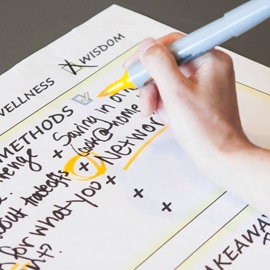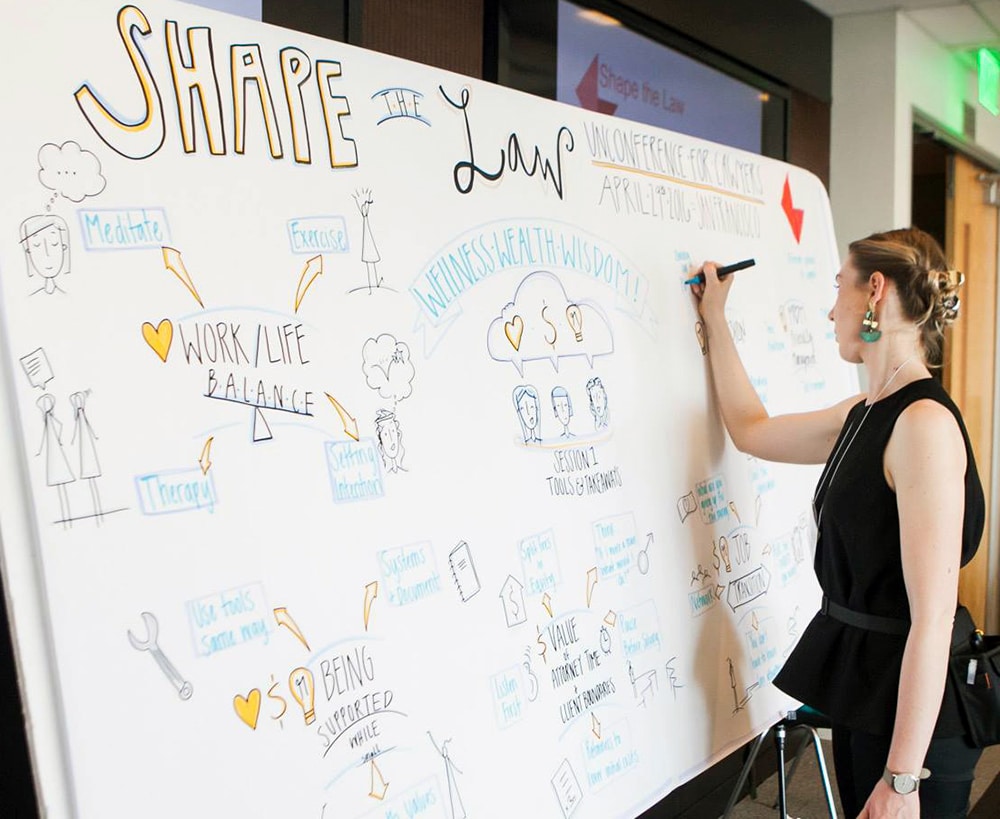Last Friday, dozens of women gathered at the San Francisco offices of Seyfarth Shaw for the first Shape the Law unconference.
No, no. You didn’t misread, and that isn’t a typo.
Popular in the technology world, an unconference transfers control of the proceedings from conference organizer to attendees. There is no set agenda when you arrive; you contribute to its creation. It may sound strange, perhaps chaotic, as it’s easy to picture a lecture hall with everyone shouting ideas as one or two people squiggle unintelligibly on blackboards.

Mindful Meditation for Organized Chaos
Every conference has a grid that lays out tracks and topics, along with a list of speakers and expectations of what’s to be discussed. Did you just yawn, or roll your eyes?
Of course, you did. That’s a conference.
Since Shape the Law is an unconference, over a delicious Mediterranean lunch, the 80 or so women lawyers in attendance got to know one another. When the plates cleared, Cho put us all in a calming mindset with a meditation exercise, asking us to focus on our breathing, the sensation of air moving in and out, and making note of what else we sense or feel.
I confess I cheated. I started with my eyes closed as instructed, and after a few breaths, I opened them to observe.
One observation: Mindfulness does not lend itself well to live tweeting. Another: The atmosphere of the room shifted to a more calm, open state as more attendees relaxed and followed Cho’s instructions.
I’m a skeptic of mindfulness unless it has to do with falling asleep, and will be the first to tell you I lack the patience for meditation. But sitting quietly, watching attendees follow mindful meditation instructions, was eye-opening and oddly relaxing.
In this open atmosphere, we started the work of shaping the conference.

The result was eight tracks, with topics spread over three sessions. The wall looked daunting from across the room, but up close it was a window into the life of a woman lawyer, as well as how the concept of “work” is changing for everyone.
Everyone Has a Voice
While shaping the unconference, two things became clear: many women had similar questions or topics they wanted to discuss, and everyone seemed thrilled they weren’t alone. There were rounds of applause, cheers and even nods of solidarity when a question was posed or issue raised that resonated with the room. Even I found myself clapping or nodding in solidarity.
While I’m not a lawyer, I, too, have to navigate the landmines of being female in a male-dominated culture. As a writer in the tech world, and not a designer or developer, my credentials are automatically questioned and challenged. Law being a male-dominated culture, much like tech, suddenly being surrounded by women who knew exactly what you were talking about was powerful, and encouraging.
This being an unconference, we were free to come and go from group to group and encouraged to let the conversation unfold naturally. It’s surprising what happens when conversation isn’t dictated ahead of time. The topic of career changes, for example, was particularly large, and you’d think it’d be unruly. Instead, it created a flurry of ideas and solutions. Other topics were smaller and more intimate groups generated action plans and instant relationships.
At the end, all the discussions, ideas, challenges and ways to tackle them were translated into visual representation for easy reference by a visual artist.
Final Unconference Thoughts
I’ve been a fan of unconferences and have, more than once, caught myself thinking “hey, this would be a great topic” over drinks, or during a dinner at a traditional conference. The same kinds of questions and challenges come up during informal conversations at traditional conferences, but there isn’t yet a good way to connect them, creating pockets of people struggling with the same thing. One or two pockets may include someone who’s found a solution, but the message doesn’t always reach the rest.
An unconference like Shape the Law is one way to fill the gap, as it were. And while the traditional conference leaves you feeling energized yet exhausted, an unconference leaves you feeling energized and empowered. You leave with newfound support from a community that had previously been in the shadows and separate from one another.
The practice of law is shifting and upending itself on many levels. While most will point to technology and the efficiencies it brings, the mindset of what it means to be a lawyer is also shifting. This causes old habits to rear themselves in an effort to protect, and its impact can be discouraging and isolating. Unconferences like Shape the Law can help you reconnect with why you got into law in the first place — and connect to a community that not only understands but can help problem-solve and be supportive.
In the constant on-demand world of today, it’s refreshing to reconnect with the touch of humanity.
Photos by Natalie Jenks, courtesy of Shape the Law. Conference graphics by The Grove Consulting.
























